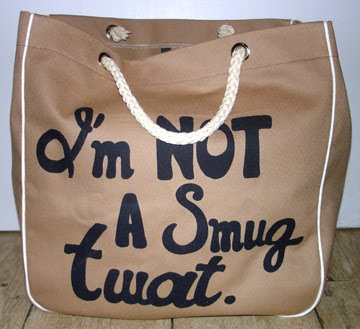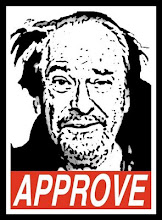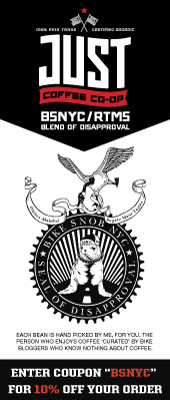I would, however, like to take this opportunity to be perhaps a little bit more smug than I usually am, and I hope that you will indulge me--though if not you're welcome to scroll down to the quiz I have "curated." In fact, to help you skip the smug, I've embedded visual cues in this post. The smugness begins after an image of Charlton Heston in the sci-fi classic "Planet of the Apes," and it ends with an image of Dr. Zaius from that very same film. So, if you can't stomach any smugness today, simply scroll down to the good doctor and proceed as normal.
 You are now in The Smugness Zone.
You are now in The Smugness Zone.
 You are now in The Smugness Zone.
You are now in The Smugness Zone.At any rate, as you may have noticed, the "media" continues to be in the throes of "bike lane mania," and has been "reporting" on the issue rather exuberantly. In particular, the lawsuit over the bike lane on Prospect Park West in Brooklyn has received much attention, and recently The Wall Street Journal offered the following piece on the affair, which skewed somewhat in favor of the anti-bike lane nebbishes:
 Of course, you can't read this if you don't subscribe to the Wall Street Journal, and indeed I don't subscribe to the Wall Street Journal, but if you'd like to "borrow" the article like I did I will point out that it is reprinted in its entirety in the comments here.
Of course, you can't read this if you don't subscribe to the Wall Street Journal, and indeed I don't subscribe to the Wall Street Journal, but if you'd like to "borrow" the article like I did I will point out that it is reprinted in its entirety in the comments here.This article irritated me for a number of reasons. For example, it perpetuates certain inaccuracies, such as the following:
Many senior citizens complain that they’ve been nearly knocked down by cyclists zooming in the wrong direction.
Many senior citizens complain that they’ve been nearly knocked down by cyclists zooming in the wrong direction.
I'm not sure how it's possible to be "zooming in the wrong direction" on a two-way bike lane.
Or consider the writer's conclusion:
This isn’t a culture war, as many would have it. It’s about New Yorkers who want to walk safely across the street—maybe even while smoking a cigarette or eating a salty pretzel.
Right. This is what it's like to cross the street on Prospect Park West, and this is what it's like to cross the street where I live. I'm surprised the irony of this eluded her.
Or then again, maybe I shouldn't be surprised. Here is the writer's bio:
Ms. Finley joined the Wall Street Journal in 2009 after graduating from Stanford University with a bachelor’s degree in American Studies. During college, she edited the opinions section for the Stanford Review and wrote columns for the Orange County Register.
I can't help wondering how much experience someone two years out of Stanford has with either driving or cycling in Brooklyn, or how much perspective she has on Prospect Park West, but between her bio and the spurious comments in her piece I would imagine it's not all that much.
Or then again, maybe I shouldn't be surprised. Here is the writer's bio:
Ms. Finley joined the Wall Street Journal in 2009 after graduating from Stanford University with a bachelor’s degree in American Studies. During college, she edited the opinions section for the Stanford Review and wrote columns for the Orange County Register.
I can't help wondering how much experience someone two years out of Stanford has with either driving or cycling in Brooklyn, or how much perspective she has on Prospect Park West, but between her bio and the spurious comments in her piece I would imagine it's not all that much.
Admittedly though the other thing that irked me was that not too long before the above piece was published the Wall Street Journal actually contacted me and asked me to write something about bike lanes. I obliged them and did so, though yesterday I learned that they would not be publishing it. Certainly they're not required to publish anything they don't want to, and certainly I may have made a mess of the assignment, but nevertheless it was irritating in the light of the aforementioned piece. Anyway, here's what I sent them:
THE ARTICLE WHAT THAT I DID WROTE ABOUT THE LANES FOR THE BIKES:
And That The Wall Street Journal Didn't Want
by BikeSnobNYC
Bicycles and automobiles are siblings. In fact, they’re fraternal twins.
In 1885, John Kemp Starley introduced the Rover Safety Bicycle. This chain-driven bike with more or less symmetrical wheels succeeded the already popular high-wheeler, or pennyfarthing, and is essentially the same machine most cyclists ride today.
Meanwhile, in 1883, Karl Benz, along with two fellow bicyclists, founded Benz & Cie, and by 1885 he had built the Benz Patent Motorwagen, which is generally considered the first automobile, and which literally put that old motor known as the “horse” out to pasture.
So why don’t these siblings seem to be playing very well together these days? As cities like New York incorporate more bike lanes into their infrastructure, drivers react like it’s the Intolerable Acts of 1774 and cyclists are freeloading Redcoats raiding their larders and leering at their daughters.
The problem isn’t with the siblings themselves; it’s with their parents (or their owners—or, in the case of cars, their lessees), who just can’t stop fighting.
As a culture, we tend to become more tolerant and refined as time passes. For example, in 1885, the Thirteenth Amendment banning slavery in the United States was only 20 years old. 20 years is not a long time—in fact, it’s only three more years than it takes to create a fully-formed Justin Bieber. (He’s 17). Now, almost seven and a half Justin Biebers later, we are a far more enlightened people. Slavery is gone, along with Jim Crow laws and segregation, and there are but a few venues left in our modern world in which it is perfectly acceptable to be closed-minded and openly prejudiced.
Commuting is one of them.
This is because, almost 120 Justin Biebers after Jesus told the parable of the Good Samaritan helping that hapless traveler who was beaten and left to die on the side of the road, commuting is still an ugly business. We hurl invective at each other. We crash into one another. Sometimes we even die. In 2009, 93 people were killed on the roads of the US every day. When it comes to getting around, we have yet to experience that Paul-on-the-road-to-Damascus epiphany in which we realize, “Hey, we better look out for each other!” Instead, we yell, and argue, and sometimes come to blows, because we still feel like we’re fighting for our lives.
Consequently, we identify with our vehicles like they’re our nationality, or religion, or race. It’s acceptable and indeed almost expected that a driver should hate a cyclist, or a cyclist should hate a driver--and that all of us should hate Segways.
In New York City, much of the new bicycling infrastructure has been laid by the Michael Bloomberg administration, under the direction of Department of Transportation Commissioner Janet Sadik-Khan. Recently, critics have maligned Sadik-Khan for these bike lanes, as well as for the installation of medians and pedestrian plazas in various parts of the city. In fact, Janet Sadik-Khan has even been called a modern-day Robert Moses, as if re-jiggering a few streets to work in a bike lane or scattering some chairs in Times Square can compare with either the lavish public gift that is Jones Beach, or the eternally nightmarish slog that is the Cross Bronx Expressway. Moses imposed his will onto the landscape like an emperor, changing it forever. By comparison Sadik-Khan is just gussying up the city cheaply with paint, chairs, and other household items, like a municipal Martha Stewart.
Not that there’s anything wrong with frugality. The city only spent $600,000 on bike lanes last year, and as Martha herself might say, “It’s a good thing.”
Bike lanes are cheap, and we need them. People are still riding bicycles in substantial numbers all these Biebers later, even after an entire 20th century of being ignored by city planners. Arguably, the bicycle industry is more robust than the automobile industry. This is partly because it is smaller and more nimble in the same way a bicycle is smaller and more nimble than a car, but it’s also because the simple fact is that lots of people ride bikes. Either way, Trek has never asked for a government bailout. Why then, in 2011, is there actually controversy about bicycles having their own lanes?
The simple answer is this: Prejudice. American drivers think bike lanes are like bidets—something weird, European, and useless.
Sure, bicycle advocates can be cloyingly smug and thus difficult to identify with, but that’s just bad marketing. The truth is, bike lanes are far from useless. Not only do they afford cyclists the safety they’ve been denied all these years, but if you’re a driver they may be your salvation too. Like many Americans who value private transportation, I have both a bicycle and a car at my disposal, and I choose one for local trips in the city, and the other to take my family to visit relatives in Connecticut. (You can probably figure out which I use for which). City streets that facilitate this choice for people like me by incorporating amenities for bicycles means more of us will be inclined to leave our cars at home more often because we’ll feel safe in doing so. On the other hand, city streets that fail to acknowledge the difference between my 20 pound bicycle and my 2,700 pound compact (to say nothing of a 7,000 pound GMC Yukon) means only two things—more danger for me, and compacts and Yukons creating more traffic for you.
Cyclists and drivers are not absolutes, living in self-contained mutual exclusivity, as both Marty Markowitz and David Byrne might lead you to believe. Many people own and use both bicycles and cars, in the same way they use vacuum cleaners and brooms, and conventional ovens and microwaves, because all of these things complement each other.
I’ve been driving in New York City as long as I’ve had a license, and I know that few things are more frustrating. That’s why it’s easy for politicians and others with agendas to point to those freshly painted bike lanes and tell drivers, “See, there’s your problem.” However, as a cyclist and a driver I also know that driving was frustrating long before the bike lanes, which have improved cycling enormously. We all stand to gain from this, but in their frustration drivers are being duped into vilifying policies that will alleviate congestion and supporting ones that will cause it.
More importantly, a century and a quarter after the safety bicycle was invented, our roads and our attitudes remain sadly outmoded and stunningly hostile to the people who use them. If you don’t believe vehicular prejudice exists in this country than consider this: In 2010, in Eagle, Colorado, a Morgan Stanley wealth manager, Martin Erzinger, fell asleep at the wheel of his car, striking bicyclist and surgeon Dr. Stephen Milo and then driving away. Milo survived, sustaining spinal cord injuries and bleeding from the brain. Erzinger was charged with two misdemeanors, and he was sentenced to a year of probation and a suspended jail term. Erzinger’s attorney argued, among other things, that his client may have been overwhelmed by the “new car smell” of his Mercedez-Benz. Something tells me that Karl Benz would not have approved.
Maybe instead of fighting each other, we parents should put aside our differences and pay more attention to our children’s safety. The smaller sibling needn’t be an afterthought, and he’s really not asking for much.
I thought I made a pretty good point, but then again I didn't go to Stanford.

With that out of the way, I'm pleased to present you with a quiz. As alway, study the item, think, and click on your answer. If you're right be smug, and if you're wrong you'll see a Lamborghini.
Thanks very much for reading, ride safe, and if you think someone's trying to pull an April Fools' prank on you just punch them in the "pants yabbies" (if they have them).
--BSNYC/RTMS

1) Complete the following messenger movie quote:
"I always wanted to move fast. I wanted to get away, but I didn't know where I was going. But it doesn't matter on a bike. Nothing matters on a bike but __________________."
2) Finally! A "collabo" between wooden bike manufacturer Renovo and:
--False
5) Tiny pies by bike are "out;" hipster canning is "in."
--True
--False
 6) Which is not a "Bicycling" magazine tip for booby-trapping your bike?
6) Which is not a "Bicycling" magazine tip for booby-trapping your bike?--Lock it with your helmet strap
--Fabricate a Rube Goldberg-esque "Hot Karl" machine with one of your socks and the contents of your saddle bag
 7) The Gerber® Gator® Combo Axe was recently recalled due to a "laceration hazard." What does it have in the handle?
7) The Gerber® Gator® Combo Axe was recently recalled due to a "laceration hazard." What does it have in the handle?
 7) The Gerber® Gator® Combo Axe was recently recalled due to a "laceration hazard." What does it have in the handle?
7) The Gerber® Gator® Combo Axe was recently recalled due to a "laceration hazard." What does it have in the handle?--A knife
***Special Smugness-Themed Bonus Question***
You're not truly smug until you:


















